
In a previous life I had a professional practice, in the context of which I had a visit from a fellow I’d run into before, though it took me quite a while to place him. “Hey!” I said, after working with the guy for a matter of weeks, “Aren’t you?...”
There was an article in the Winnipeg Free Press; some people were complaining about a window display that they found offensive. The window belonged to a record store called Roxy’s. What I found interesting about the whole thing was that I’d never been there. How did I miss it I don’t know. Normally I could smell vinyl miles away.
So I checked it out. They had a selection of used LPs, but not enough to be a quality second-hand shop; they had a selection of not used LPs’ but not enough to challenge Sam The Record Man. They had a few obvious collectors’ items, and a sign that told the customer that for $10 they’d tape any LP in the shop for you. This was c. 1989; the World Wide Web would not exist for another 5 years; there were no music downloads, and cassettes were still mainstream. And $10 to tape an LP was pretty steep.
So I made a deal with the guy. I have trade-ins I said. Ok he said. He took the trade-ins, a couple of LPs by Gary Lewis & The Playboys, LPs he was on the lookout for. I gave him a cassette. And I said tape this for me. It was
Bobby's Biggeset Hits, by Bobby Rydell.
That was it, man. Bobby Rydell’s stuff was so hard to find. I had one single that I’d picked up at Pyramid, it was Butterfly Baby. The LP covered his stuff from the beginning (Kissing Time) until. Later I picked up a few more singles: I Wanna Thank You, Sway, I’ve Got Bonnie, and the transcendentally beautiful Forget Him.
Ok, back to Roxy’s. So I checked in a few days later, but no go. He hadn’t had time. Next time I came in and there was a woman at the counter. I told her what I was after. Who did you speak to she said. You know I said, that guy that’s always here, the manager. With a beard? She asked. Yes I said. Oh she said disdainfully, my clerk! Sure I said. The clerk. I’ll find out what’s going on she said, obviously not pleased with the aforesaid clerk.
Next time I came he handed me back the LPs and my tape. Can’t do it he said. No explanation. No matter. I returned later with the same tape and $10, and this time a real clerk was at the desk. And so I got Bobby Rydell.
Turns out that the “clerk” was the lady’s husband.
And the window display that people were complaining about? They had the bottom half of a number of female manikins, they’d dressed them in bikini bottoms (no place to put the tops obviously) and they’d stuck LP covers into the waistbands of the bikinis. It was truly appalling. I walked in there and complained right away. How can you leave those LPs in the window, I said. The sun will ruin them!
I’ve recently picked up the CD collection called
The Best Of Bobby Rydell, 1959 – 1964, and I’ve supplemented it with a few leftover tracks from that original LP, the one I had taped, and some B sides, and some tracks from --- which collects Bobby’s entire Capital output. Somehow or other, I’ve never been able to find The Fish, his only top 40 hit that’s not in my collection.
And if you want to read more about my relationship with Bobby Rydell:
Sappy And Proud Of It.
Bobby Rydell:
•
Please Don’t Be Mad – An early recording, in which Bobby was cast as doo-wop group, doing his best conflict resolution. The style turned out to be a dead-end experiment.
•
All I Want Is You – An MOR ballad, and another dead-end experiment but not quite. After he left Cameo-Parkway, Bobby signed with Capital and embarked on an unsuccessful career as a crooner.
•
We Got Love – This is the mirror image of Heartache By The Numbers. We got love by the numbers says our hero, and the songwriters have a bit of fun, using “for” for 4 and “to” for 2. A hit as 1959 rolled into 1960.
•
I Dig Girls – Bobby the stud. Gotta give him credit; he likes ‘em all – big, small, pretty, ugly, “short fat Fannie or as thin as a rail.” The B side of We Got Love, this song ended up just shy of the top 40 in late 1959.
•
Kissin’ Time – “Birds do it,” wrote Cole Porter, “bees do it, even educated fleas do it...” Indeed. The song was called Let’s Do It, Let’s Fall In Love, and the theme of going along with the crowd is taken up here by Bobby, all of whose persuasive skills are employed convincing his girl of the moment that a bit of kissing, or whatever “kissing” really meant in this song, is in order. “They’re kissing in Cleveland,” he sings, beginning a geographical catalogue of activity that was to find an echo a few years in Martha & The Vandellas’ Dancing In The Streets, “they’re kissing on Bandstand,” he sings, paying simultaneous homage to the up and coming TV show and his mentor, Dick Clark, all the while anticipating her inevitable resistance, which he compares to the battle of New Orleans, which may have been playing on the radio at the exact moment that whomever wrote this song was writing it. This record kicked off Bobby’s career in grand style, in the fall of 1959. And I wonder about fleas, educated or otherwise…
•
You’ll Never Tame Me – Bobbie sox heroes like to cast themselves as tough guys; think Fabian doing Tiger. Nobody believed them. At least they had the decency to bury this on a B side (of Kissin’ Time).
•
Wild One – Not the Martha & The Vandellas hit. The Guess Who also did a song called Wild One, but theirs was way obscure. “I’m going to tame you down” he says, using rather odd syntax to tackle a semi-common subject in pop music, the taming of the wild would-be partner. This song reached number 2 in the winter of 1960, and was his highest placing single.
•
Ding-A-Ling – A term of endearment, but the record (pun intended) does not reveal its success. From the summer of 1960. The B side of Swingin’ School.
•
Swingin’ School – How uncool is this. The most famous rahrah song in the history of pop was undoubtedly Be True To Your School by The Beach Boys; this was a primer. From the summer of 1960, just as school was ending.
•
Little Bitty Girl – He searches the world. In I Dig Girls he didn’t care, but here size seems to be very important to Bobby. From the winter of 1960, the B side of Wild One.
•
Volare – Also known as Nel Blu Di Pinto Di Blu (Volare) and a hit for Domenico Modugno. Dean Martin provided the world with a hit version in English. Bobby’s version is a not-much-poppier version of Dean’s rendition. From the fall of 1960.
•
I’d Do It Again – The B side of Volare is a paean to being faithful in the face of the greatest temptations. He even tells of his move-stardom, and how he declined to kiss Brigitte Bardot. Maybe he was thinking of Anne Margaret.
•
Sway – Not The Rolling Stones song, obviously. Dino did this one too. It’s a dancing song about dancing. Anyone? You have to be careful with something like this, but Bobby nails it. From the winter of 1960 / 1961.
•
Groovy Tonight – This has to be one of the earliest recorded uses of the word “groovy,” and imagine – it was Bobby Rydell. This mild “let’s party” invitation was the B side of Sway, and it was a hit at the same time.
•
That Old Black Magic – Bobby was on a roll, doing standards. He doesn’t do much with this, to be honest. It was recorded by many, and was a hit not long before this for Louis Prima & Keely Smith. From the summer of 1961.
•
I Wanna Thank You – A trick song. He’s thanking the girl who put him down, because now he’s with someone cool. This could be the sequel, I guess, to If I Fell. From the autumn of 1961.
•
Butterfly Baby – Butterflies are always free. There was the movie with Goldie Hawn, there was the song by Elton John, there was Butterfly by Charlie Gracie / Andy Williams. This is the same idea. From the winter of 1963.
•
Good Time Baby – Doesn’t pull any punches. He could’ve called it Back Seat Baby. My copy of Whitburn lists it as Good Times Baby. Even the great Joel Whitburn makes mistakes. From the winter of 1961.
•
I’ve Got Bonnie – And I bet she lies over the ocean. From the winter of 1962.
•
I’ll Never Dance Again – I grew up listening to this song on a Herman’s Hermits album, but the original has all the real melodrama. It was The Drifters who made the request Save The Last Dance For Me, and who knows if she did (Damita Jo notwithstanding) but here we get the real goods. No last dance, not with him anyway. And yeah, I feel his pain, being 16 years old and watching the girl you imagine going with dancing her head off with some other dude. Ok, in the song, he wasn’t imagining, but let’s bring this down to reality. And speaking of reality, it’s BS, that he’ll never dance again. He’ll get over her. From the summer of 1962.
•
The Third House (In From The Right) – Let’s party! Slightly reminscient of A Quarter To Three, but only just.
•
Wildwood Days – Wild days really, I don’t know what Wildwood means, maybe it’s the name of a place, hard to tell. This ode to partying was a hit in the summer of 1963.
•
The Cha-Cha-Cha – You wouldn’t think a song with this title would be any good, but you’d be wrong. You’d be forgiven for thinking that Sam Cooke had the last word, but somehow Bobby manages to convey a lot of romance into the 2 step. From the fall of 1962.
•
Forget Him – The melody climbs, bit by bit, until Bobby proclaims that “he can’t give you love which isn’t there. “ It comes back down, and climbs again, and when he’s singing “Forget him and please come home to me” he’s soaring. This is transcendently beautiful, and not even those silly quacking noises at the beginning can ruin it. I grew up with this one too, on a Gary Lewis & The Playboys LP, but the original leaves old Gary in the dust. I never get tired of this one. It spent 16 weeks in the top 100, peaking in the early part of 1964.
•
A World Without Love – Suddenly faced with the British competition, Bobby goes head to head. Here he sings Lennon and McCartney, but the hit belonged to Peter & Gordon, and Bobby is the one who got left in the dust. He peaked at number 80 in the summer of ’64; P&G hit number 1. The TO chart saw this reach number 9.
•
Jingle Bell Rock – With Chubby Checker, and I have the song there too. From the 1961 Christmas season. Bobby Helms could rest easy.
•
A Message From Bobby – A spoken promo from a bonus single included on one of his albums.
•
Make Me Forget – Here is Bobby’s entry into what is an interesting sub-category of love song, the using-one-girl-to-forget-another song. One thinks of Help Me Rhonda, If I Fell, Yes It Is (sort of). It’s a real thing in the real world, not a good basis for a relationship, but a great basis for a love song. From the spring of 1964, just when his career was crashing and burning.
•
Diana – This was his one hit for Capital, and it wasn’t much of a hit; it was on the top 100 for exactly 1 week in February, 1965, at number 98. This is the Paul Anka song, rendered as a ballad, and it’s not half bad; I think it deserved to do better, but still there is no way to save a line like “I can feel you giving all your charms.” • Door To Paradise – One of those euphemisms that turn up again and again in the world of pop. Come right out and say it, man. The B side of I Wanna Thank You, from the fall of 1961.
•
Gee It’s Wonderful – This was the B side of I’ll Never Dance Again. In Toronto it was a hit alongside the A side. The tune is We Got Love redux.
•
Will You Be My Baby – This is a bit of a clinker. The B side of something but I “disremember” what.
•
Little Girl You’ve Had A Busy Day – Busy being traumatized by relationship issues, to hear him tell…
•
Lose Her – After all, she’s a loser. A song about a bad news chick. It’s a direct line from this to The Rolling Stones’ Stupid Girl, Under My Thumb etc, except Jagger lost the humour along the way. TO heard this one also, as the B Side of I’ve Got Bonnie.
•
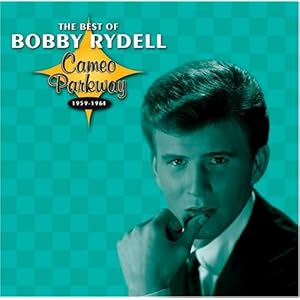 Cherie
Cherie – The tune is an exact replica of Little Darling by The Gladiolas / Diamonds. Not to be confused with Cherie I Love You by Pat Boone. This Cherie is an unabashed love song, very sweet. The B side of Good Time Baby, from the winter of 1961. This is for Sherry, the one that got away…
•
Don’t Be Afraid To Fall In Love – With all those people with commitment issues, both genders, this is a real concern. Didn’t make Billboard, but it was a Canadian hit in the spring of 1961. The B side of That Old Black Magic.
•
Teach Me To Twist – With Chubby Checker. Chubby wasn’t the greatest dancer in the world – he was no Jackie Wilson after all – but he had the rep, and this has the appropriate novelty value. This record didn’t make the top 100, but it was a Canadian hit in the spring of 1962.
•
I Just Can't Say Goodbye - Bobby's recordings for Capital were rather undistinguished, which is why, I suppose, he didn't have any hits there (Diana was it , and it wasn't much of a hit. )
•
The Joker - Not the Steve Miller song.
•
It Takes Two - Not the Marvin Gaye & Kim Weston Song
•
Roses In The Snow•
Not You•
You Gotta Enjoy Joy - And you gotta love love.
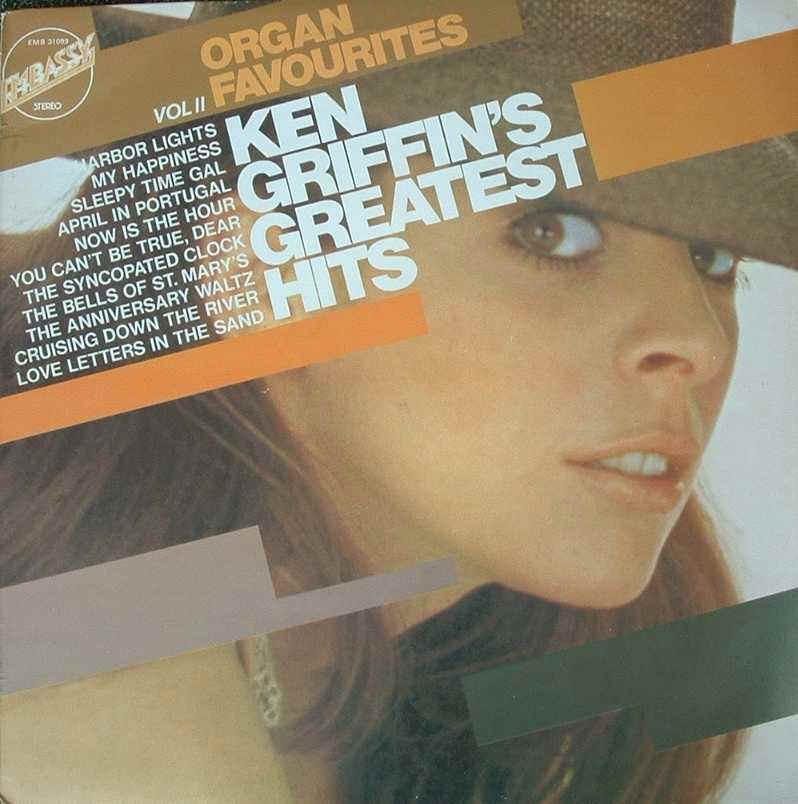 This is way out of sync. Ken Griffin died in 1956.
This is way out of sync. Ken Griffin died in 1956. I got my one and only Ernie Fields track on a collection of rock and roll instrumentals on K-Tel. Or it might have been Ronco.
I got my one and only Ernie Fields track on a collection of rock and roll instrumentals on K-Tel. Or it might have been Ronco. renders into some kind of rock and roll, though what kind isn’t clear. Bette Midler had a minor hit with this, a follow-up to Boogie Woogie Bugle Boy. From the fall of 1959 and credited to Ernie Fields Orchestra.
renders into some kind of rock and roll, though what kind isn’t clear. Bette Midler had a minor hit with this, a follow-up to Boogie Woogie Bugle Boy. From the fall of 1959 and credited to Ernie Fields Orchestra.
 Paul Evans is listed as Paul Evans & The Curls in Rock Almanac by Stephen Nugent and Charlie Gillett. That was the first book I got with chart listings. It lists all the records that were on the US and UK top 20 between 1955 and 1973. It also has LP listings, which is interesting. I won’t say that the book changed my life, though it did, because that would just make me too nerdy. Later I got Whitburn’s top 40, Whitburn’s top 100 book, and a book listing records on the CHUM charts.
Paul Evans is listed as Paul Evans & The Curls in Rock Almanac by Stephen Nugent and Charlie Gillett. That was the first book I got with chart listings. It lists all the records that were on the US and UK top 20 between 1955 and 1973. It also has LP listings, which is interesting. I won’t say that the book changed my life, though it did, because that would just make me too nerdy. Later I got Whitburn’s top 40, Whitburn’s top 100 book, and a book listing records on the CHUM charts.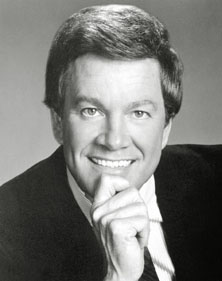 Wink (Winston was his real name) was a TV and radio personality who happened to put 2 songs into the top 100. I think that I got this from a K-Tel country music collection.
Wink (Winston was his real name) was a TV and radio personality who happened to put 2 songs into the top 100. I think that I got this from a K-Tel country music collection. Let’s have a word for Snuffy Garrett, the most underappreciated record producer in the business. Garrett made magic with teen idols like Gene McDaniel, Johnny Burnette, and with vocal underweights like Bobby Vee and Gary Lewis. Not to knock Phil Spector or Milt Gabler or Tom Dowd, but I’ll take Snuffy. So on to Bobby Vee…
Let’s have a word for Snuffy Garrett, the most underappreciated record producer in the business. Garrett made magic with teen idols like Gene McDaniel, Johnny Burnette, and with vocal underweights like Bobby Vee and Gary Lewis. Not to knock Phil Spector or Milt Gabler or Tom Dowd, but I’ll take Snuffy. So on to Bobby Vee… other it all worked out, and tomorrow they’re getting married. And her name is Suzie, so everything has come full circle.
other it all worked out, and tomorrow they’re getting married. And her name is Suzie, so everything has come full circle.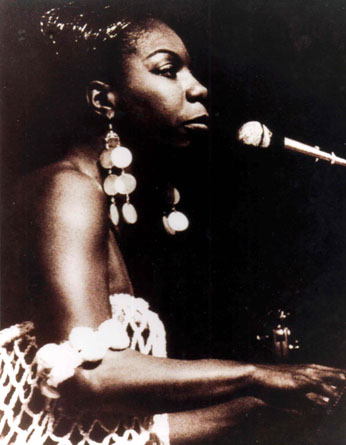 I have two collections by Nina Simone. The other is part of the Jazz Masters series, and it’s more wide-ranging then this, but neither that one nor this one has any of her top 100 entries apart from I Loves You Porgy. She had 6 altogether (not counting the reissue of My Baby Just Cares For Me, described below), but none, apart from Porgy, reached higher than 78.
I have two collections by Nina Simone. The other is part of the Jazz Masters series, and it’s more wide-ranging then this, but neither that one nor this one has any of her top 100 entries apart from I Loves You Porgy. She had 6 altogether (not counting the reissue of My Baby Just Cares For Me, described below), but none, apart from Porgy, reached higher than 78. In a previous life I had a professional practice, in the context of which I had a visit from a fellow I’d run into before, though it took me quite a while to place him. “Hey!” I said, after working with the guy for a matter of weeks, “Aren’t you?...”
In a previous life I had a professional practice, in the context of which I had a visit from a fellow I’d run into before, though it took me quite a while to place him. “Hey!” I said, after working with the guy for a matter of weeks, “Aren’t you?...”
 You often see cheap CDs near the checkout at Zeller’s or Wal-Mart, favourites by your favourite oldies groups, and if you look closely you’ll see a notice in small writing that says something like this: “This collection features stereo re-recordings by one or more of the original artists.” They mention stereo in the vain hope that you may think that point was improvement.
You often see cheap CDs near the checkout at Zeller’s or Wal-Mart, favourites by your favourite oldies groups, and if you look closely you’ll see a notice in small writing that says something like this: “This collection features stereo re-recordings by one or more of the original artists.” They mention stereo in the vain hope that you may think that point was improvement. The great thing about top 40 radio back when it mattered was this: anything could be on there. Most of it was what you’d expect – pop, rock, rhythm & blues. There was quite a bit of MOR (Al Martino, Lawrence Welk, Andy Williams) and country (Tammy Wynette, Buck Owens, Marty Robbins Johnny Cash). There was even bona fide jazz (Take Five by The Dave Brubeck Quartet reached number 25 in 1961, Desifando by Stan Getz and Charlie Byrd reached number 15 in 1962).
The great thing about top 40 radio back when it mattered was this: anything could be on there. Most of it was what you’d expect – pop, rock, rhythm & blues. There was quite a bit of MOR (Al Martino, Lawrence Welk, Andy Williams) and country (Tammy Wynette, Buck Owens, Marty Robbins Johnny Cash). There was even bona fide jazz (Take Five by The Dave Brubeck Quartet reached number 25 in 1961, Desifando by Stan Getz and Charlie Byrd reached number 15 in 1962).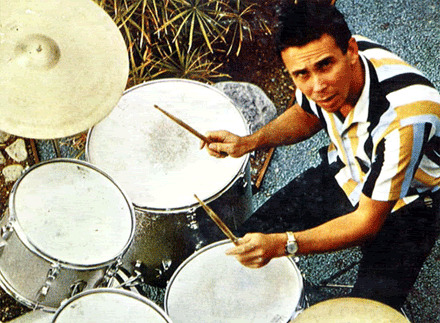 I don’t know who did the first rock drum solo. Maybe it was Ron Bushy, Iron Butterfly’s drummer, on In-A-Gaada-Da-Vida. Later came Toad by Cream, Moby Dick by Led Zeppelin, Key by The Guess Who, TNUC by Grand Funk Railroad etc etc etc etc.
I don’t know who did the first rock drum solo. Maybe it was Ron Bushy, Iron Butterfly’s drummer, on In-A-Gaada-Da-Vida. Later came Toad by Cream, Moby Dick by Led Zeppelin, Key by The Guess Who, TNUC by Grand Funk Railroad etc etc etc etc. You won’t find Craig Douglas in Whitburn, and you won’t likely have heard him growing up in North America, but he put 9 songs into the UK top 20 between 1959 and 1962, including covers of Dion & The Belmonts (Teenager In Love), Steve Lawrence (Pretty Blue Eyes), Gene McDaniels (A Hundred Pounds Of Clay), The Drifters (When My Little Girl Is Smiling), and Don Gibson (Oh Lonesome Me). I found this on The Roots Of British Rock.
You won’t find Craig Douglas in Whitburn, and you won’t likely have heard him growing up in North America, but he put 9 songs into the UK top 20 between 1959 and 1962, including covers of Dion & The Belmonts (Teenager In Love), Steve Lawrence (Pretty Blue Eyes), Gene McDaniels (A Hundred Pounds Of Clay), The Drifters (When My Little Girl Is Smiling), and Don Gibson (Oh Lonesome Me). I found this on The Roots Of British Rock. Thank heaven for Homer & Jethro who remind us not to take it all so damn seriously. These guys take songs about heartbreak, about the difficulties of trying to keep your soul together, about the condition known as life, and tear it all to pieces with a joy that has this humble blogger laughing his head off.
Thank heaven for Homer & Jethro who remind us not to take it all so damn seriously. These guys take songs about heartbreak, about the difficulties of trying to keep your soul together, about the condition known as life, and tear it all to pieces with a joy that has this humble blogger laughing his head off. These guys were around for a few years in the late 50s and early 60s but they weren’t hugely successful, perhaps because they named themselves after an insect. (Yes yes I know about The Crickets and The Beatles, but The Crickets had Buddy Holly and The Beatles were not exactly The Beetles). They only had one other minor hit besides You Were Mine.
These guys were around for a few years in the late 50s and early 60s but they weren’t hugely successful, perhaps because they named themselves after an insect. (Yes yes I know about The Crickets and The Beatles, but The Crickets had Buddy Holly and The Beatles were not exactly The Beetles). They only had one other minor hit besides You Were Mine. This guy was Croation. It seems he had quite an international career, but it old NA he only had 2 pop hits, and only one was in English.
This guy was Croation. It seems he had quite an international career, but it old NA he only had 2 pop hits, and only one was in English. Before Jim Ed Brown had a solo career he was big brother in The Browns. He was also kid brother in The Browns, who were a sister-brother-sister group, who had 7 hits in the top 100 between 1959 and 1961, inclusive. They are not all here, though this LP covers their career from 1954 until 1965.
Before Jim Ed Brown had a solo career he was big brother in The Browns. He was also kid brother in The Browns, who were a sister-brother-sister group, who had 7 hits in the top 100 between 1959 and 1961, inclusive. They are not all here, though this LP covers their career from 1954 until 1965.
